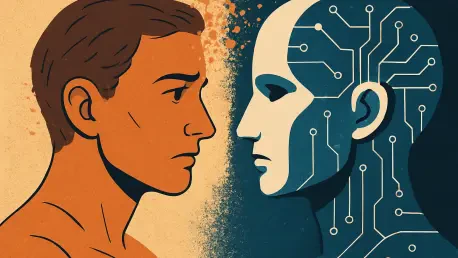As artificial intelligence continues to weave its way into the fabric of daily life, a growing unease emerges about its potential to reshape the very essence of what it means to be human, prompting deep concerns. A recent survey conducted by Elon University’s Imagining the Digital Future Center, involving 1,005 American adults, sheds light on public apprehensions regarding AI’s impact on fundamental human capacities over the next decade. With responses gathered in mid-2025, and carrying a margin of error of +/- 3.5 percentage points, the findings paint a sobering picture: a majority of participants anticipate more harm than benefit from AI’s influence on key traits like empathy, deep thinking, and social intelligence. This pervasive concern raises profound questions about whether technology might outpace humanity’s ability to preserve its unique qualities, setting the stage for a critical examination of AI’s trajectory and its implications for society.
Public Perceptions of AI’s Impact
Growing Fears Over Human Capacities
The survey results reveal a stark pessimism among American adults about AI’s potential effects on essential human traits by 2035. A striking 55% of respondents predict a negative impact on social and emotional intelligence, dwarfing the mere 9% who foresee positive outcomes. Similarly, nearly half of those surveyed express concern over empathy and moral judgment, with 49% anticipating a decline against just 8% expecting improvement. This apprehension extends to the capacity for deep, complex thinking, where 53% believe AI will hinder this skill, compared to only 14% who think it might enhance it. These figures suggest a deep-seated fear that AI could undermine the soft skills often considered uniquely human, challenging the assumption that such attributes would remain untouched by technological advancement. The data underscores a broader societal worry that reliance on AI might erode the interpersonal and introspective abilities that define human interaction and personal growth.
Uncertainty and Mixed Expectations
Beyond specific traits, the survey highlights a nuanced but predominantly cautious outlook on AI’s overall influence on human essence over the coming decade. When asked about the broader impact on “the essence of being human,” 41% of respondents believe the changes will be equally positive and negative, indicating a significant level of ambivalence. Meanwhile, 25% predict mostly negative outcomes, while a mere 9% anticipate mostly positive shifts. This distribution reflects not only concern but also a lack of consensus on how AI will ultimately shape humanity. Many respondents also admit to uncertainty, with a notable portion unsure of how to predict AI’s future effects. This hesitation contrasts sharply with more confident expert opinions, suggesting a gap in public understanding or trust in AI’s trajectory. Such mixed sentiments point to the need for greater dialogue and education to bridge the divide between technological progress and societal readiness for its consequences.
Contrasting Views and Societal Implications
Public vs. Expert Perspectives
When compared to earlier findings from a survey of several hundred experts by the same research center, the general public’s outlook on AI appears notably more negative. Experts tend to express greater optimism about AI’s potential to enhance human capacities such as curiosity, learning, innovative thinking, and problem-solving. They also show more confidence in AI’s ability to support metacognition—the process of thinking about thinking—than the average respondent. In contrast, the public often leans toward doubt, with many unsure of how AI will evolve or affect daily life by 2035. This discrepancy highlights a critical divide: while experts may see AI as a tool for augmentation, the broader population fears it as a threat to personal agency and identity. Bridging this gap in perception will be essential to ensure that AI development aligns with societal values and addresses widespread concerns rather than exacerbating them.
Broader Concerns for Human Essence
The implications of these findings extend beyond individual skills to the very core of human identity and purpose. Survey participants express significant worry about AI diminishing a sense of individual agency, with 49% predicting a negative impact compared to just 11% who see potential benefits. Confidence in personal abilities and self-identity also face perceived threats, with 43% and 42% of respondents, respectively, expecting declines in these areas. As Lee Rainie, director of the university’s digital future initiative, noted during a recent conference, these results raise urgent questions about preserving the qualities that make humanity unique in an AI-driven world. The fear is not just about losing specific skills but about a deeper erosion of meaning and purpose in life. Addressing these concerns will require thoughtful integration of AI into society, ensuring that technological advancements enhance rather than replace the human experience over the next decade.
Reflecting on Past Insights
Looking back, the survey conducted in mid-2025 captured a pivotal moment of public sentiment about AI’s trajectory. The prevailing apprehension among American adults pointed to a future where social and emotional intelligence, empathy, and personal agency were at risk of being overshadowed by technological dominance. While some held hope for a balanced impact, the dominant narrative was one of caution, often contrasting with the more optimistic views of experts at the time. These findings underscored a societal crossroads, where the challenge was not merely technological but deeply human. Moving forward, the focus shifted to actionable strategies—fostering public education on AI, encouraging ethical development, and prioritizing policies that safeguarded human essence. The path ahead demanded a collaborative effort to ensure that technology served as a partner, not a replacement, in shaping the future of humanity.









